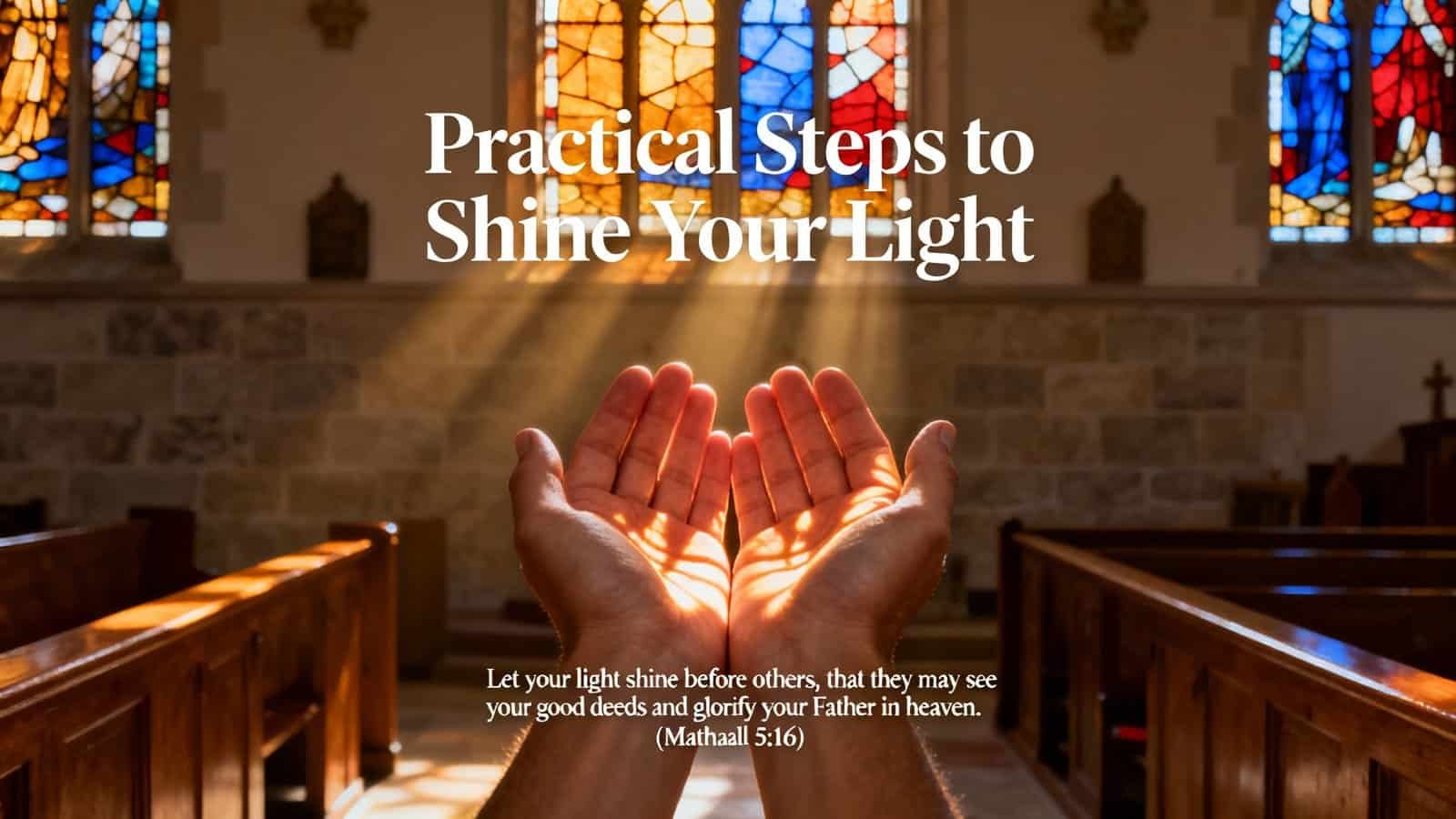
10 Nov Practical Steps to Shine Your Light From the Bible Verse
You’re called to shine as light in darkness by removing spiritual bushels like fear, unforgiveness, and pride that conceal Christ’s radiance within you. Start each morning with Scripture before checking your phone, cultivate consistent prayer as spiritual oxygen, and use your God-given talents to serve others practically—whether through meals for the sick, compassionate listening, or anonymous generosity. When you establish these daily rhythms while maintaining healthy boundaries, your authentic brightness transforms communities and reveals specific practices that sustain lifelong luminosity.
Table of Contents
Key Takeaways
- Remove spiritual obstacles like fear, unforgiveness, and pride through confession and submission to God’s grace rather than willpower alone.
- Establish daily habits including morning Scripture reading, prayer, and journaling to fuel spiritual brightness before checking your phone.
- Use your unique gifts and talents boldly for God’s glory through creative stewardship, serving others, and meeting practical community needs.
- Practice radical love through small acts of kindness, anonymous generosity, and compassionate listening without rushing to fix others’ problems.
- Speak truth with balanced courage and compassion, examining your own heart first before offering gentle confrontation seasoned with grace.
Understanding What Your Light Represents in Scripture

Truth illuminates everything it touches, and Scripture reveals that the light within you isn’t merely metaphorical—it’s the very presence of Christ dwelling in your heart.
When Jesus declared “You are the light of the world” in Matthew 5:14, He wasn’t offering a suggestion—He was defining your spiritual identity.
The symbolic imagery throughout Scripture consistently portrays light as divine truth, righteousness, and God’s transformative power.
You’re called to reflect Christ’s nature, not generate your own brilliance. Just as the moon reflects the sun’s radiance, you mirror the Son’s glory to a darkened world.
Your light represents three essential elements: God’s truth that exposes deception, His love that draws the lost, and His holiness that transforms communities.
You don’t shine to display yourself but to reveal the Father’s character. This light isn’t earned through religious performance—it’s received through relationship with Christ and expressed through obedient living.
Identifying and Removing Spiritual Bushels That Hide Your Light
When fear grips your heart, it becomes the most common bushel that conceals the light Christ has placed within you. You’ll recognize these hidden obstacles through prayerful self-examination—unforgiveness, pride, shame, and compromise all work to dim your witness. Jesus warns that no one lights a lamp only to hide it, yet you might unconsciously do this very thing.
Look honestly at the soul clutter that’s accumulated over time. Bitterness toward others blocks love’s radiance. Secret sins create shadows where light should shine. Comparing yourself to others breeds either pride or insecurity—both snuff out authentic testimony.
You can’t remove these bushels through willpower alone. Submit each one to God’s transforming grace. Confess what He reveals, forgive as you’ve been forgiven, and let His truth replace every lie you’ve believed. As these spiritual barriers fall away, your light naturally breaks forth, illuminating the path for others to find Christ.
Cultivating Daily Habits That Fuel Your Spiritual Brightness

Once you’ve cleared away the bushels that dim your witness, you’ll need consistent spiritual practices to keep your light burning bright. Your morning routines set the tone for radiating Christ’s presence throughout the day. Start with Scripture reading before checking your phone—let God’s Word be your first input. Prayer doesn’t require eloquence; simply talk with your Father who delights in your voice.
Devotional journaling transforms fleeting insights into concrete spiritual growth. Write what God’s teaching you, record answered prayers, and document His faithfulness. This practice sharpens your spiritual awareness and creates a testimony treasury you’ll draw from when encouraging others.
Worship through your daily tasks—washing dishes becomes an act of service, your commute becomes prayer time. Memorize Scripture during routine activities. These habits aren’t burdensome additions but life-giving rhythms that naturally overflow into blessing others. When you’re consistently filled with His presence, you can’t help but shine.
Using Your Unique Gifts and Talents for God’s Glory
God has wired you with specific abilities that reflect His creative genius, and these aren’t random—they’re strategic tools for advancing His kingdom. Your spiritual gifts aren’t meant to gather dust but to illuminate dark places. Whether you’re gifted in teaching, serving, encouraging, or leading, each talent carries divine purpose (1 Corinthians 12:4-7).
You’re called to practice creative stewardship with what you’ve received. Don’t bury your talents like the fearful servant in Jesus’ parable. Instead, invest them boldly for eternal impact. Your artistic abilities can worship Him. Your business acumen can fund ministry. Your compassionate heart can heal wounds. Your analytical mind can solve kingdom problems.
Ask yourself: “How can I use this gift to serve others and glorify God?” When you operate in your God-given abilities, you’re not just doing good works—you’re fulfilling your created purpose and shining His light authentically.
Practicing Radical Love and Kindness in Everyday Encounters

When Jesus commanded you to love your neighbor as yourself, He didn’t add exceptions for those who irritate, hurt, or ignore you.
Your light shines brightest through small, unnoticed acts of kindness—holding your tongue when provoked, offering help without being asked, or choosing gentleness when you’d rather react harshly.
God calls you to extend radical love especially to difficult people, serving without applause or recognition, because this mirrors Christ’s own sacrificial love for you.
Small Acts Matter Most
Consider how a single candle can illuminate an entire room, transforming darkness with its modest flame. Your small acts of love carry this same transformative power.
Jesus taught that whoever gives even a cup of water in His name won’t lose their reward (Matthew 10:42). You’re called to practice quiet generosity—helping without fanfare, giving without recognition.
Your unnoticed encouragement might be the very thing that keeps someone from despair. Send that text. Share that meal. Offer that prayer.
God sees every hidden kindness, every secret sacrifice. He’s not looking for grand gestures but faithful obedience in daily moments.
When you hold the door, listen patiently, or forgive quickly, you’re shining His light. These seemingly insignificant acts ripple through eternity, touching hearts you’ll never know you’ve reached.
Love Your Difficult People
Loving those who irritate, hurt, or oppose you reveals the supernatural nature of Christ’s love working through you.
When someone’s behavior consistently drains your peace, you’re called to respond differently than the world expects. Practice compassionate detachment—you can care deeply while maintaining healthy boundaries that protect your emotional wellbeing.
Sometimes love requires gracious confrontation. Speaking truth with gentleness isn’t weakness; it’s strength under divine control.
You’ll find that difficult people often carry hidden wounds driving their behavior. Your consistent kindness might be the first glimpse of God’s love they’ve encountered.
Don’t let their darkness extinguish your light. Instead, let your response demonstrate what transformation looks like. You’re not responsible for changing them—that’s God’s work. You’re simply called to love faithfully.
Kindness Without Recognition
Behind every unnoticed act of kindness, you’re building treasures in heaven that outshine earthly recognition. Jesus taught that your Father who sees in secret will reward you openly (Matthew 6:4). When you practice anonymous generosity—paying someone’s bill, leaving encouraging notes, or meeting needs quietly—you’re following Christ’s example of servant leadership.
Your unnoticed service reflects God’s heart most purely when it expects nothing in return. Hold doors for strangers, clean up messes you didn’t make, and pray for people who’ll never know. These hidden acts of love transform both giver and receiver. You’re not performing for applause but partnering with God’s kingdom work. Each unseen kindness plants seeds that bloom into eternal harvest, proving that heaven’s economy values what the world overlooks.
Speaking Truth With Grace in a Dark World
When you’re called to speak God’s truth in today’s culture, you face a unique challenge that requires both courage and compassion. You can’t compromise biblical principles, yet you’re commanded to season your words with salt and grace. This balance isn’t weakness—it’s wisdom.
Practice gentle confrontation by first examining your own heart. Remove the plank from your eye before addressing someone else’s speck. When you do speak, let truthful tenderness guide your tone. Jesus demonstrated this perfectly with the woman at the well—He revealed her sin without crushing her spirit.
You’ll encounter hostility when sharing God’s standards. Don’t respond with matching aggression. Instead, answer softly to turn away wrath. Ask questions that prompt reflection rather than making accusations. Remember, you’re not trying to win arguments but to win souls. The Holy Spirit convicts; you simply plant seeds with humility and love.
Building a Prayer Life That Ignites Your Inner Flame
Though you’ve mastered speaking truth with grace, your words will ring hollow without the power that flows from intimate communion with God. Prayer isn’t just religious duty—it’s the oxygen that feeds your spiritual fire. Jesus Himself rose before dawn to pray (Mark 1:35), modeling the priority of morning silence with the Father.
Start small but stay consistent. Set aside fifteen minutes each morning before checking your phone. Find a quiet corner where you won’t be interrupted. Begin with Scripture meditation—read a psalm slowly, letting God’s words shape your prayers. Don’t rush through a list of requests. Instead, listen. Let His presence transform you from within.
As you develop this rhythm, you’ll notice changes. Your anxiety decreases. Your discernment sharpens. Your love deepens. The light within you grows brighter because you’re connected to the Source.
When trials come, you won’t merely survive—you’ll shine with supernatural peace that draws others to Christ.
Creating Boundaries That Protect Your Spiritual Energy
While prayer fills your spiritual reservoir, you’ll quickly drain it without proper boundaries to guard what God has deposited within you. Jesus himself withdrew from crowds to pray and rest (Luke 5:16), modeling the necessity of spiritual rest for sustained ministry. You can’t pour from an empty cup, and God doesn’t call you to spiritual exhaustion.
Establish emotional boundaries by learning to say “no” without guilt. Not every need is your assignment. Galatians 6:5 reminds you to “carry your own load,” distinguishing between helping others and enabling unhealthy dependence. Protect your peace by limiting exposure to toxic relationships that consistently drain your spiritual energy.
Schedule regular sabbath moments—daily, weekly, and seasonally. These aren’t luxuries but divine commands for restoration. Set boundaries around your time with God, your family time, and your rest. When you honor these limits, you’re stewarding the light God’s entrusted to you, ensuring it burns bright rather than burning out.
Serving Others as a Reflection of Christ’s Light
Protected and restored by healthy boundaries, you’re now positioned to pour out Christ’s love through acts of service.
Jesus demonstrated that true greatness comes through humble service when He washed His disciples’ feet (John 13:14-15). You’re called to follow His example by meeting practical needs in your community—whether that’s preparing meals for the sick, tutoring struggling students, or maintaining a widow’s yard.
Your light shines brightest through compassionate listening.
When you sit with someone in their pain without rushing to fix everything, you reflect Christ’s patient presence. James 1:19 instructs you to be “quick to listen, slow to speak.” This ministry of presence often impacts hearts more than elaborate programs.
Persevering Through Seasons When Your Light Feels Dim
Even when darkness seems overwhelming, Scripture promises that “the light shines in the darkness, and the darkness hasn’t overcome it” (John 1:5).
You’ll face seasons where your spiritual flame flickers and faith feels fragile. This spiritual ebbing isn’t failure—it’s human.
During these valleys, remember that God’s strength perfects itself in your weakness (2 Corinthians 12:9).
You don’t need to manufacture brightness; you’re called to remain connected to the Source.
Like Elijah under the broom tree, you might feel depleted and alone, but God’s still working, providing sustenance for the journey ahead.
Seasonal resilience develops through honest prayer, even when words won’t come.
Keep showing up to Scripture, even when it feels dry.
Maintain community, especially when you’d rather isolate.
Your dim seasons aren’t permanent. They’re refining fires that deepen your capacity to shine authentically.
Trust that He who began this good work will complete it.
Frequently Asked Questions
How Do I Explain “Letting My Light Shine” to Non-Believers Without Sounding Preachy?
You’ll connect better by using practical examples from everyday life. Instead of quoting Scripture directly, share how your faith motivates you to serve others, show kindness, or maintain integrity at work. Use respectful language that focuses on actions rather than beliefs – “I try to help my neighbors because it’s important to me” rather than “The Bible says.
Let your actions demonstrate Christ’s love naturally, creating curiosity without forcing conversations.
What if My Family Members Mock or Criticize My Newfound Spiritual Brightness?
When family members mock your faith, you’re called to respond gracefully while setting boundaries that protect your spiritual growth.
Don’t retaliate with harsh words; instead, let your consistent love speak louder than arguments.
You can kindly say, “I respect your views, but this brings me peace.”
Remember Jesus faced rejection from His own hometown.
Your gentle strength and unchanged love toward them will eventually witness more powerfully than debates ever could.
Can I Shine My Light Effectively While Struggling With Mental Health Issues?
Yes, you can absolutely shine God’s light while battling mental health challenges. Your struggles don’t diminish His power working through you.
Paul’s thorn in the flesh didn’t stop his ministry. Prioritize self-care as stewardship of God’s temple—your body.
Seek professional help without shame; it’s wisdom, not weakness. You’re often most effective when you’re honest about your journey.
Your authentic testimony of God’s sustaining grace touches hearts deeply.
Should I Leave My Current Job if It Prevents Me From Shining?
Don’t rush to quit. God often calls you to shine where you’re planted, transforming difficult workplaces through your witness.
First, negotiate boundaries that protect your faith and wellbeing. If you must eventually leave, leave quietly without burning bridges, following Christ’s example of wisdom. Seek godly counsel and pray for clarity. Sometimes staying becomes your greatest testimony; other times, departing opens doors for kingdom impact elsewhere.
How Young Is Too Young to Teach Children About Shining Their Light?
You’re never too young to begin faith formation! Even in early childhood, children can grasp age-appropriate lessons about kindness and love.
Jesus welcomed little ones, knowing their hearts were ready. Start with simple concepts: sharing toys demonstrates God’s love, helping others shows His light.
As moral development progresses, deepen the teaching. By age three, they’ll understand “letting your light shine” means being kind, helpful, and showing Jesus’ love to friends.
Conclusion
You’ve been called to be a beacon in this dark world, and now you know how. Don’t let fear or doubt convince you that your light doesn’t matter—it does. Every act of love, every prayer, every use of your gifts illuminates the Father’s glory. When you feel dim, remember: Christ’s light within you never fails. Keep shining, dear one. Your consistent, faithful glow draws others home to Him. That’s your divine purpose.











No Comments